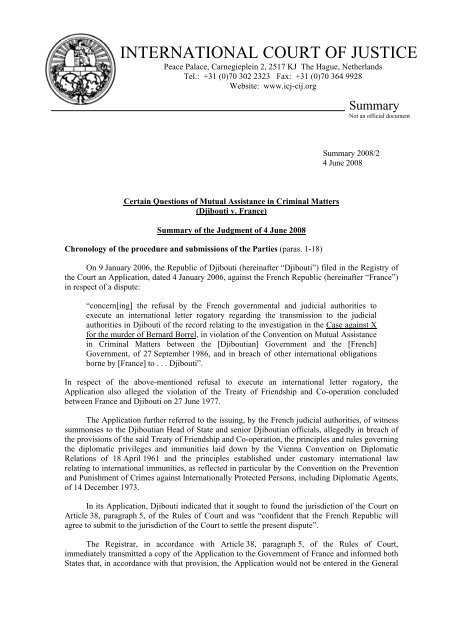Checking Out the Historical Background of Letters Rogatory in Legal Frameworks
Checking Out the Historical Background of Letters Rogatory in Legal Frameworks
Blog Article
Letters Rogatory Explained: Facilitating Legal Teamwork Between Countries

Interpretation of Letters Rogatory
Letters rogatory are formal requests made by a court in one territory to a court in another jurisdiction, looking for assistance in acquiring proof or testament for a legal case. This step-by-step mechanism is crucial in the context of international legislation, where lawful systems might differ, and cross-border teamwork is essential. Letters rogatory help with the event of details that might be essential for settling instances, especially in instances including intricate transnational issues.
Normally, these demands arise in civil, criminal, or administrative issues where a party requires evidence that lies outside the territory of the requesting court. The letters act as a way to make sure that the principles of due procedure are promoted, making it possible for courts to accessibility proof that might otherwise remain inaccessible because of geographic or lawful barriers.
Making use of letters rogatory is regulated by worldwide treaties, bilateral contracts, or domestic laws, which delineate the procedures and obligations of the courts involved. It is important to note that the implementation of such demands is not assured; they depend upon the legislations and methods of the jurisdiction receiving the letter. Thus, letters rogatory are a pivotal device for cultivating legal teamwork and guaranteeing justice across borders.
The Refine of Issuing Letters Rogatory
Issuing letters rogatory includes a structured procedure that makes certain conformity with both global and residential legal standards. Originally, the asking for celebration, usually a court or legal authority, composes an official request describing the nature of the help sought, the proof or info needed, and the lawful basis for the request. This record needs to be precise to help with understanding by the foreign territory.

The following step includes transmitting the letters rogatory to the assigned foreign authority. This is frequently done via diplomatic channels or international lawful assistance structures, ensuring that the demand is received and recognized by the foreign court. The international court then refines the request according to its own legal procedures, inevitably responding to the asking for event with the in-demand information or evidence, hence assisting in international legal teamwork.
Value in International Law
The relevance of letters rogatory in worldwide regulation can not be overstated, as they function as a critical system for judicial cooperation throughout boundaries. These official requests for aid in legal matters allow courts in one jurisdiction to inquire, proof, or the visibility of witnesses from another territory, therefore assisting in the administration of justice in multinational instances.
Letters rogatory are specifically crucial in the context of globalization, where lawful disputes typically span numerous countries. They allow the collection of evidence that might otherwise be unattainable, making certain that lawful process are notified and reasonable. By fostering partnership in between judicial systems, letters rogatory help support the policy of legislation and promote mutual respect amongst countries.
In addition, making use of letters rogatory shows a dedication to international norms and concepts of cooperation, mirroring the interconnected nature of contemporary lawful practices. It shows the value of adhering to established procedures and treaties, such as the Hague Convention, which provides a structure for these demands - Letters rogatory. Inevitably, letters rogatory boost the efficiency of lawful processes, making sure that justice is not hindered by geographical borders
Obstacles and Limitations
Regardless of their importance, letters rogatory face numerous difficulties and constraints that can hamper their effectiveness. One key issue is the varying lawful structures and procedures throughout jurisdictions, which can lead to misconceptions and hold-ups in the execution of requests. Various nations may have unique needs for the validity of letters rogatory, complicating the process better.
Furthermore, the often lengthy nature of international lawful participation can impede timely access to proof or witnesses. This hold-up might look at this now negatively influence ongoing investigations or legal procedures, specifically in instances calling for immediate activity. Additionally, the lack of resources and training in some jurisdictions can result in not enough handling of demands, causing inadequate or insufficient feedbacks.
Nations with less formal lawful systems might struggle to conform with the Check Out Your URL step-by-step rigor expected in letters rogatory. These obstacles necessitate constant discussion and reform to boost the efficacy of letters rogatory in legal participation.
Study and Instances

On the other hand, challenges can develop, as seen in an instance involving a European nation looking for evidence in a continuous criminal issue from a non-EU country - Letters rogatory. The process was delayed as a result of bureaucratic obstacles and varying lawful standards, eventually preventing the examination
These examples show that while letters rogatory can assist in global cooperation and accelerate lawful process, they also highlight the need for clear communication and understanding of legal structures in between nations. Such instance studies underscore the significance of refining this device to improve performance and performance in international legal matters.
Conclusion
In recap, letters rogatory serve as a crucial mechanism for helping with legal participation in between countries, ensuring the collection of proof and statement across territories. Their relevance in global law can not be overstated, as they advertise due process and improve the performance of cross-border legal proceedings.
Letters rogatory are official demands made by a court in one territory to a court in one more jurisdiction, looking for help in obtaining proof or testimony for a lawful proceeding. The asking for celebration, typically a court or lawful authority, drafts an official request outlining the nature of the assistance looked for, the evidence or info required, and the legal basis for the demand. The foreign court after that refines the request according to its very own legal procedures, inevitably responding to the asking for party with the in-demand information or proof, hence assisting in global legal teamwork.
Moreover, the usage of letters rogatory shows a commitment to worldwide standards and principles of participation, showing the interconnected nature of contemporary lawful techniques.International lawful participation through letters rogatory is not without its real-world ramifications, as highlighted by various situation researches that highlight both successes and original site challenges.
Report this page